|
3/30/2014 Reflections on Faith and NonviolenceBy Christine Murray, See the Triumph Co-Founder
I’m taking a different approach to today’s blog post, in that I want to share some personal reflections on how my own faith has shaped my views about abuse and nonviolence. As a lifelong Christian (I’ve attended mostly Presbyterian churches throughout my life, and now attend a non-denominational church), it really pains me when I see or hear about situations where religion is used to justify abuse, and especially when it raises the risk for further abuse to victims. For some examples of this from our research, please see my post on March 11 on “The Stigma of Intimate Partner Violence in Churches: Part Three - How Religion Can Perpetuate Abuse.” Loving-Kindness My own take on religion, including the Christian faith (which I’m most familiar with), is that loving-kindness, above all, is a reflection of God’s love for all us. I absolutely cannot see how any form of abuse--be it physical, sexual, or emotional--can be justified within relationships. The Biblical passage from 1 Corinthians 13: 4-13, which is often read at weddings, provides a glimpse into what I believe is God’s vision for our relationships: 4 Love is patient, love is kind. It does not envy, it does not boast, it is not proud. 5 It does not dishonor others, it is not self-seeking, it is not easily angered, it keeps no record of wrongs. 6 Love does not delight in evil but rejoices with the truth. 7 It always protects, always trusts, always hopes, always perseveres. 8 Love never fails. But where there are prophecies, they will cease; where there are tongues, they will be stilled; where there is knowledge, it will pass away. 9 For we know in part and we prophesy in part, 10 but when completeness comes, what is in part disappears. 11 When I was a child, I talked like a child, I thought like a child, I reasoned like a child. When I became a man, I put the ways of childhood behind me. 12 For now we see only a reflection as in a mirror; then we shall see face to face. Now I know in part; then I shall know fully, even as I am fully known. 13 And now these three remain: faith, hope and love. But the greatest of these is love. (NIV) My takeaway from this passage is that love is embodied in relationships as patience, kindness, honor, peace, forgiveness, and trust. Of course, as humans, we can’t perfectly achieve these virtues every moment. However, abuse--characterized by dominance, power, control, rage, and torment--simply is not compatible with this view of loving relationships that we find in 1 Corinthians. Submission One of the Bible verses that is often used to justify abuse is from Ephesians 5:22-24: 22 Wives, submit yourselves to your own husbands as you do to the Lord. 23 For the husband is the head of the wife as Christ is the head of the church, his body, of which he is the Savior. 24 Now as the church submits to Christ, so also wives should submit to their husbands in everything. (NIV) Taken out of context, this verse suggests that women are to submit to their husbands, regardless of the circumstances (i.e., “wives should submit to their husbands in everything”). Too often, I believe that this has been taken to mean that wives should submit to their husbands even within an abusive context. And yet, when we read on to the next verses in Ephesians 5:25-33, we see that submission is not a one-way street. 25 Husbands, love your wives, just as Christ loved the church and gave himself up for her 26 to make her holy, cleansing her by the washing with water through the word, 27 and to present her to himself as a radiant church, without stain or wrinkle or any other blemish, but holy and blameless. 28 In this same way, husbands ought to love their wives as their own bodies. He who loves his wife loves himself. 29 After all, no one ever hated their own body, but they feed and care for their body, just as Christ does the church— 30 for we are members of his body. 31 “For this reason a man will leave his father and mother and be united to his wife, and the two will become one flesh.”32 This is a profound mystery—but I am talking about Christ and the church. 33 However, each one of you also must love his wife as he loves himself, and the wife must respect her husband. The responsibility for husbands is to treat their wives in loving ways, even “to love their wives as their own bodies.” This means they “feed and care for” their wives in a loving way. Again, how can this love and care be compatible with abuse? When I look at the full picture of these verses in Ephesians 5, I see a broader vision for how people should treat each other in any type of relationship, not just husband-wife relationships. My interpretation is that in relationships, all people should submit to one another by loving them, caring for them, actively working to meet their needs, and following the “golden rule” to treat them as they themselves would like to be treated. Why Should People of Faith Care about Abuse? Proverbs 31:8 says, “Speak up for those who cannot speak for themselves.” To me, this verse is a call to action to help others facing challenges that limit their power and ability to advocate for themselves, both within one’s own faith community and in the broader community. People who are being abused often cannot speak for themselves. Their partners may have threatened to harm them if they tell anyone about their abuse. They may not feel they have options to leave an abusive relationship, especially if they are financially dependent on their abusers. In light of the abuse they experienced, their self-esteem may be hurting so much that they don’t believe that they deserve better. They may even believe they deserve to be abused after hearing that it’s their fault from their abuser and others. They also may be facing significant negative consequences from their abuse--such as physical injuries or mental health symptoms--that make it difficult for them to leave. These challenges can continue even after a person has left an abusive relationship. All this month, we’ve focused on how faith communities can take action to challenge the stigma surrounding abuse and provide support to survivors. I believe that these actions are a significant way that churches can be a driving force in the movement to end intimate partner violence. Although our month-long focus on this topic is coming to an end, we hope you’ll continue to share ideas, resources, and creative ways that faith communities can speak up for survivors and play a key role in preventing further abuse! 3/27/2014 Secrets of A Pastor's Wife RevealedBy Maxine Browne, See the Triumph Guest Blogger In the ministry, reputation is everything. Pastors not only personify leadership, but holiness. They are expected to be above reproach. If their personal lives are dysfunctional, they are perceived to be unworthy of their position. As a pastor’s wife, you smile when you feel sad and are silent when you want to scream. But this is true of the wife of any prominent man. Part of your role is to guard your family’s public image. But what if your husband is abusive? Who do you talk to? If word leaks out, it could affect the congregation of your church. The parishioners may lose respect for their leader. So, a pastor’s wife may think long and hard about seeking help. How do I know? I was a pastor’s wife. Leaving my abusive marriage was the most difficult decision I ever made. I knew my choice would hurt other people, and that was what held me captive for so long. I felt so trapped in my situation I had planned my suicide. I left instead. So, consider this when working with families in leadership in your congregations. There may be things hidden from view, secrets kept for the sake of public opinion endangering the family’s welfare. How many people in your church are hiding behind a mask because they don’t think they can talk about what is really happening in their lives? There needs to be a place where church leaders can expose their humanity and find support when they are experiencing tough times. After all, they’re only human, just like everyone else. Note: This blog is re-posted from http://frombrokentobutterfly.blogspot.com/2014/01/secrets-of-pastors-wife-revealed.html  Bio for Maxine Brown: Maxine Browne is a keynote speaker and workshop facilitator on the topics of domestic violence and rebuilding your life after divorce. Her inspirational stories illustrate how to co-parent with a difficult ex and how to create healthier relationships. Maxine is one of the 27 amazing co-authors of the International Best Seller, The Missing Piece compiled by Kate Gardner, as well as one of the co-authors for The Missing Piece in Business. She is also the author of Years of Tears, the story of her 10 year marriage to a controlling tyrant that changed her life forever. Contact Maxine to speak at your next event at [email protected]. Visit her website at www.maxinebrowne.com. By Maxine Browne, See the Triumph Guest Blogger Sometimes we forget that the church is a reflection of our society as a whole. Whatever ills are present outside of the church are also present within its walls. And that goes for domestic violence. It is estimated that 1 in 4 women will experience domestic violence in their lifetime. Since intimate partner violence is a largely underreported crime, it is likely more prevalent that we care to imagine. If you know the signs to watch for, you can be more effective spotting domestic violence within your congregation. 1. Stuck together with Velcro In a controlling relationship, the couple will almost always be seen together. They’ll rarely have separate conversations or wander around the church unaccompanied by their partner. So, have you noticed a couple who is almost never seen independent of their spouse? 2. One spouse does all the talking In a controlling relationship, one partner dominates every conversation, while their spouse may gradually lose themselves. They become a silent observer, rarely voicing an opinion of any kind. Their mate may even mildly put down their partner to keep them quiet. “She doesn’t really understand things like that.” One spouse may even answer for their partner, cutting them off before they have a chance to respond to questions asked. So, have you noticed a couple where only one person speaks? 3. One spouse must ask permission There is nothing wrong with having to check in with our spouse to be sure the family has no plans this weekend before committing to something new. However, in a controlling relationship, there is a parent/child dynamic in play, where one must ask permission to participate in things. So, have you noticed an adult having to ask their partner’s permission to attend an event or participate on a committee? 4. One spouse serves at every event attended by their partner A controlling spouse may insist on ushering at the Women’s Retreat or cooking for the Ladies Breakfast. Their helpfulness is actually a way to discretely keep their spouse under surveillance. At the very least, they may insist on driving their spouse to the event and picking them up afterwards. They may even arrive early and hang around in the back of the room, justifying their presence by saying they were in town anyway and just killing time. So, have you noticed overly eager or inappropriate offers to help? Have you noticed a spouse hanging around to drive their partner home? It may not be as innocent as it looks. 5. The dead look in his/her eyes does not match the plastered smile on their face Living in a controlling or abusive relationship can lead to depression. The victim may feel cornered, trapped and under constant pressure. The victim may lose their ability to speak up for themselves. The victim may struggle to keep their faith. So, have you noticed anyone who seems withdrawn or down in the dumps? Has someone come to you about doubts about God’s faithfulness and love? What you can do about it? 1. If someone in your congregation approaches you about their spouse, believe them. Many victims complain that their spiritual leader did not take their concerns seriously when they sought help. The leader could not accept that Brother So-And-So could be mean, or Deacon “Smith” would hurt anyone, much less his spouse and kids. After all, he or she has been a faithful member for so many years and contributes so much to the community. Remember, anyone can wear a mask in church and anyone can be the victim of abuse. 2. Never insist on couple’s counseling if one of them complains about control or abuse. In cases of domestic violence or a controlling spouse, couple’s counseling is a bad idea. If the victim reveals anything to the counselor in front of their abuser, they will pay dearly for it at home. It may increase the level of danger for them due to retaliatory tactics. It’s best to refer the victim to a domestic violence program. They know best how to handle things such as this. They also know what resources are available for the victim’s specific situation. 3. Hang up posters or put resource phone numbers in both of the restrooms. This may be the only time that the individual has without their spouse next to them. Victims can be male or female, so offer resources to both genders. Note: This blog is re-posted from http://frombrokentobutterfly.blogspot.com/2014/01/5-warning-signs-of-spousal-abuse-within.html  Bio for Maxine Brown: Maxine Browne is a keynote speaker and workshop facilitator on the topics of domestic violence and rebuilding your life after divorce. Her inspirational stories illustrate how to co-parent with a difficult ex and how to create healthier relationships. Maxine is one of the 27 amazing co-authors of the International Best Seller, The Missing Piece compiled by Kate Gardner, as well as one of the co-authors for The Missing Piece in Business. She is also the author of Years of Tears, the story of her 10 year marriage to a controlling tyrant that changed her life forever. Contact Maxine to speak at your next event at [email protected]. Visit her website at www.maxinebrowne.com. Counseling Today, an official publication of the American Counseling Association, is featuring a story on the See the Triumph Campaign. You can check it out the following link: http://ct.counseling.org/2014/03/triumph-tales-counselors-research-project-on-domestic-violence-blossoms-into-website-social-media-campaign-highlighting-survivors-personal-stories/.
Thanks to writer Bethany Bray for highlighting our work! By Christine Murray, See the Triumph Co-Founder
This month, we’ve been focusing on ways that churches can help to challenge the stigma surrounding intimate partner violence, and especially the stigma the survivors may face from within their faith communities. One idea that we heard on how faith communities could do this is by providing a forum for survivors to share their stories. As we’ve discussed before, the choice for whether survivors want to tell their stories should always be completely up to them. Sharing one’s story can be very powerful, but it can also bring potential safety risks. Also, a survivor who shares his or her story may face harmful reactions from others, such as disbelief, blame, and a general lack of support or validation. If a survivor feels safe to share his or her story within a church setting--whether that is with a full congregation or with smaller groups within the church--this can provide a very powerful opportunity for both the survivor and the other members of the faith community. The survivor may feel empowered by the opportunity to inspire and educate others through their experiences. In turn, community members can learn from the survivor, thereby becoming more aware of the dynamics of intimate partner violence and the needs that other survivors may face. I think we can learn from the experiences of some of the survivors in our research on how best to set up these speaking opportunities in a way that is safe for the survivor and educational for the community. To that end, I offer the following three suggestions: 1. When possible, work in conjunction with local domestic violence agencies. One survivor said, “On three occasions in large faith-based group settings, I've shared my story as a survivor speaker for a community agency that advocates for DV victims and their families. The reaction of most have been compassionate and empathetic.” Having the involvement of local professionals is useful for at least two reasons. First, professionals can supplement the information provided by survivors by offering local resources and information about the common dynamics involved in domestic violence cases. Second, hearing a story of one person’s abuse can prompt others in a group to disclose their own abuse histories. A professional can therefore help to respond to these new disclosures and direct these people to appropriate community resources as needed. 2. Respond to the survivor’s story with empathy and support. Even survivors who are comfortable sharing their stories can be very sensitive to negative responses from others. For example, one survivor in our research said that, after she shared her story, people “responded in silence through actions, facial expressions as if to say ‘why is she sharing her dirty laundry?’ This collection of folks find ways to avoid eye contact when our paths have crossed again.” Such a response can add to the stigma surrounding abuse for the speaker. In addition to the speaker, this can be hurtful to other survivors in the audience. Although it’s not possible to control how every single person will respond to a survivor’s story in a public or group setting, church leaders can be vocal in expressing a validating and supportive response and thereby set the tone for the other community members’ responses. 3. Encourage church members to keep an open mind to hearing ideas and experiences that are different from their own. One of our research participants said, “You have an uphill battle to end stigmatization in fundamentalist faith communities because very often they are resistant to hearing anything that contradicts their paradigms.” Of course, every faith community will hold true to its religious beliefs and values, and that’s an important part of what unites that community. At the same time, sometimes difficult experiences, such as abuse, do not fit neatly into religious belief systems. Furthermore, as we explored in a previous post, sometimes religious values and beliefs are applied in ways that add to the stigma surrounding abuse and increase the safety risks for survivors. Therefore, an openness to hearing difficult stories and considering how religious beliefs intersect with those stories can help congregations begin to really challenge the stigma surrounding abuse. I’ve personally spoken with church groups about domestic violence, and most often I have found them to be very concerned about this issue and wanting to help support survivors however they can. I believe that creating safe spaces for survivors to share their stories is one important way that religious groups can support survivors and raise awareness about intimate partner violence among faith communities. Share your ideas with us, too! What do you think are the barriers to creating safe places for survivors to share their stories in faith communities? What ideas do you have for creating more of these opportunities in your own faith community? |
Archives
July 2024
CategoriesAll About Intimate Partner Violence About Intimate Partner Violence Advocacy Ambassadors Children Churches College Campuses Cultural Issues Domestic Violence Awareness Month Financial Recovery How To Help A Friend Human Rights Human-rights Immigrants International Media Overcoming Past Abuse Overcoming-past-abuse Parenting Prevention Resources For Survivors Safe Relationships Following Abuse Schools Selfcare Self-care Sexual Assault Sexuality Social Justice Social-justice Stigma Supporting Survivors Survivor Quotes Survivor-quotes Survivor Stories Teen Dating Violence Trafficking Transformative-approaches |
Search by typing & pressing enter


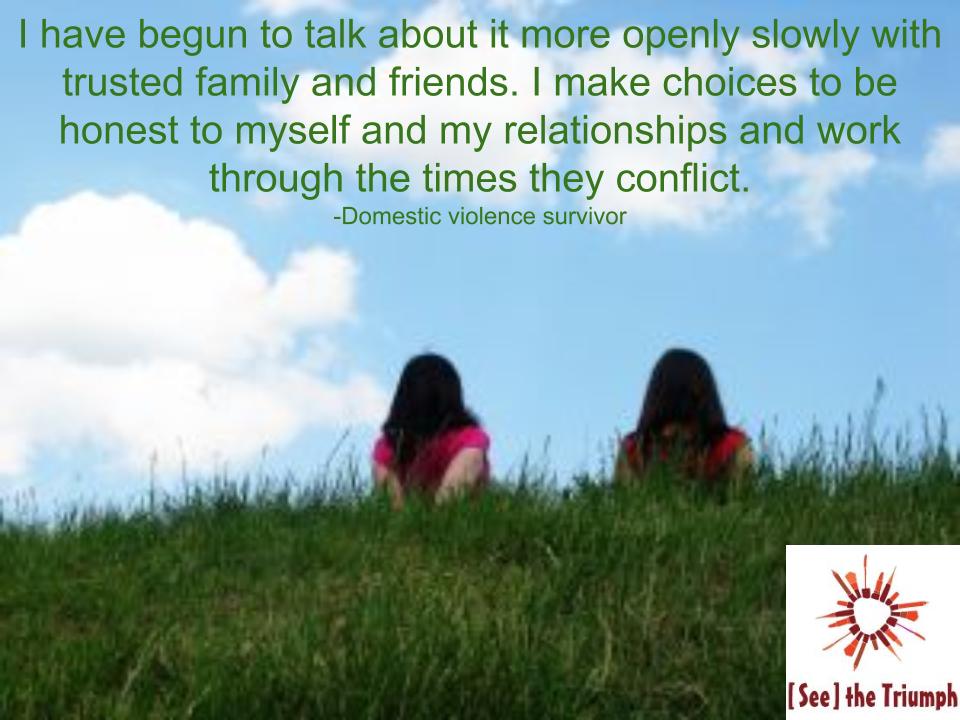
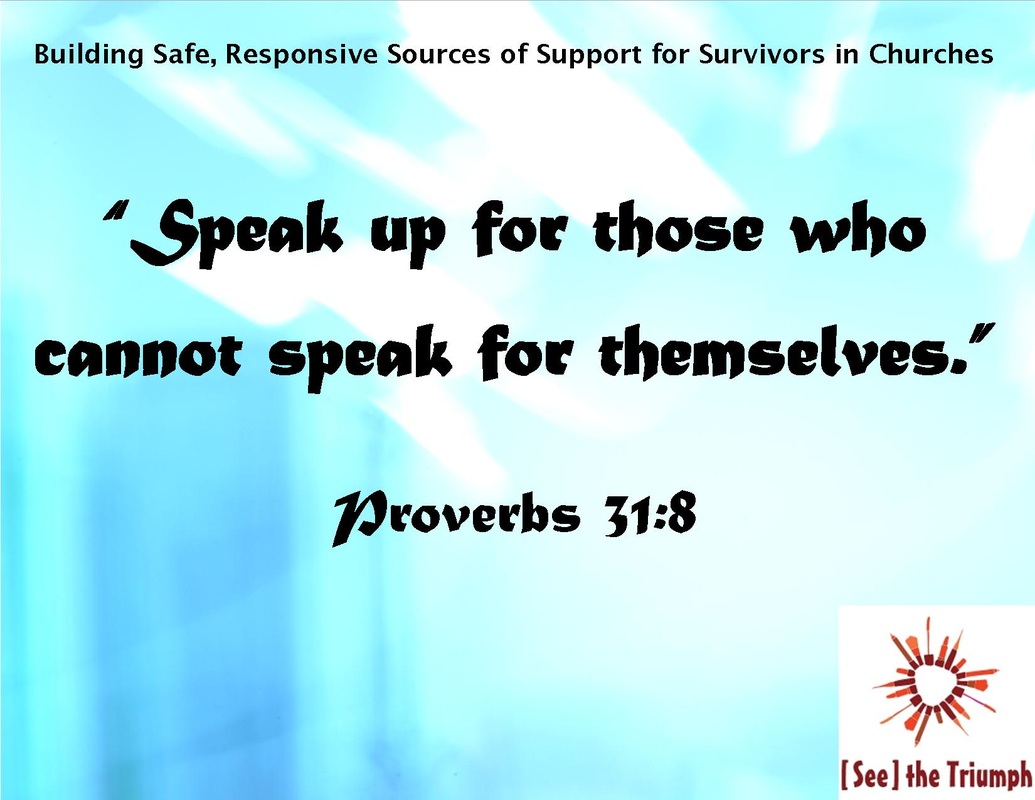
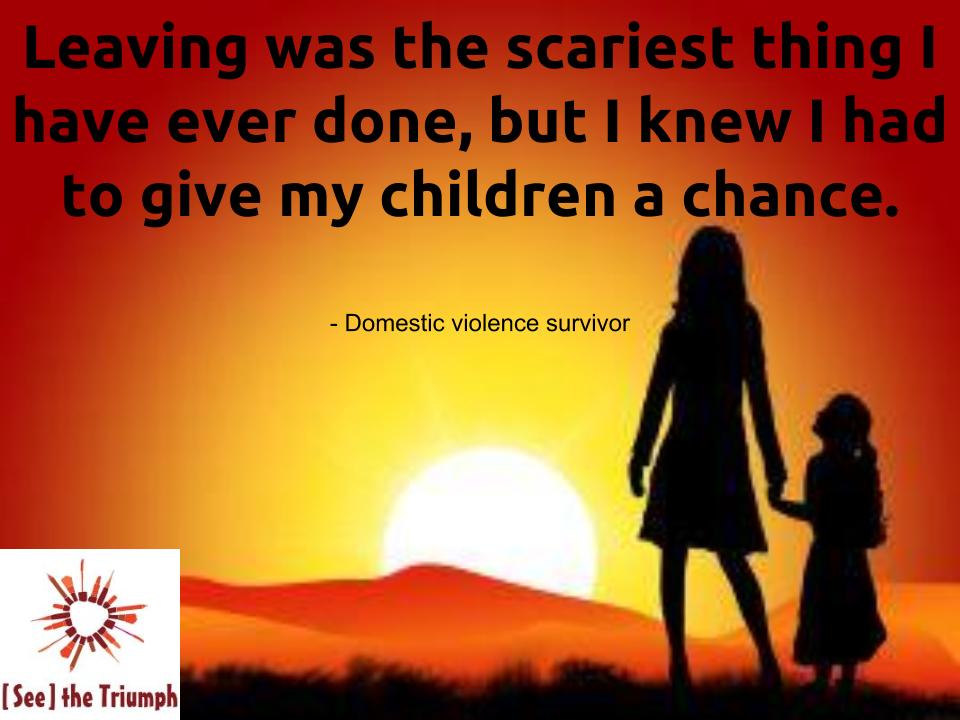
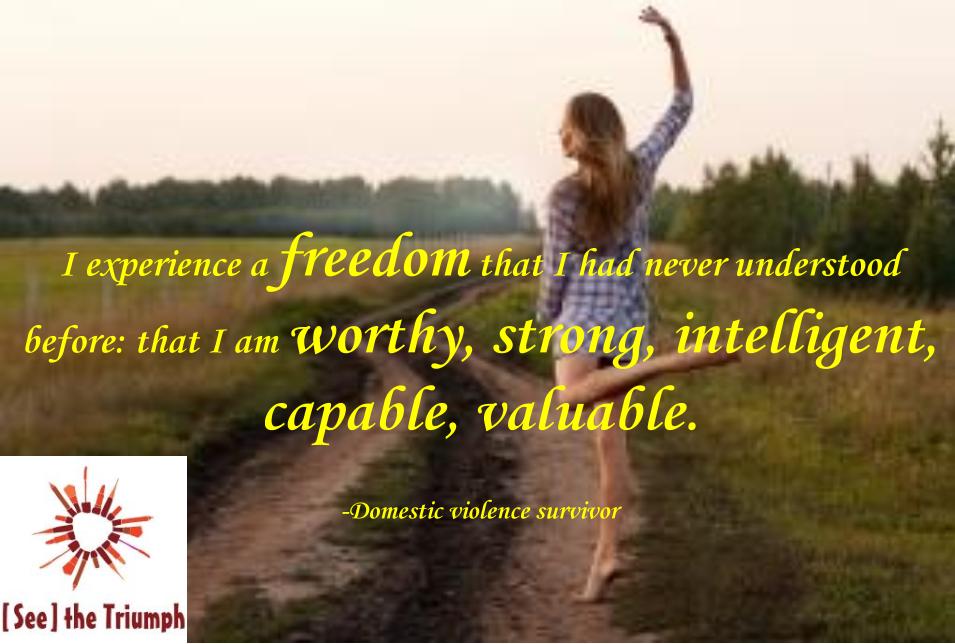
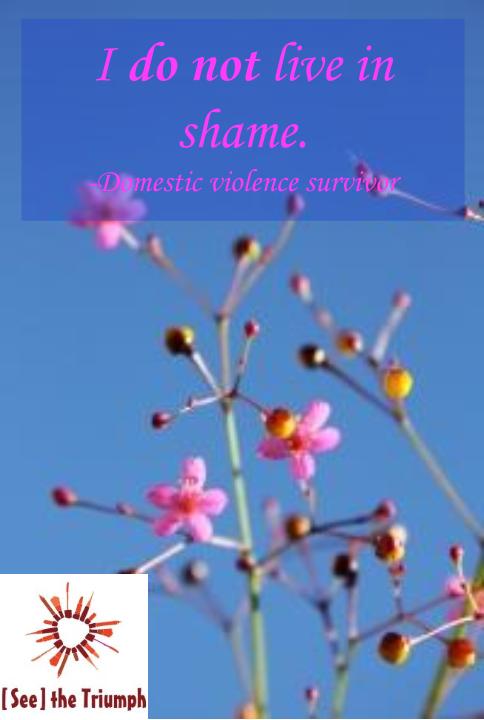
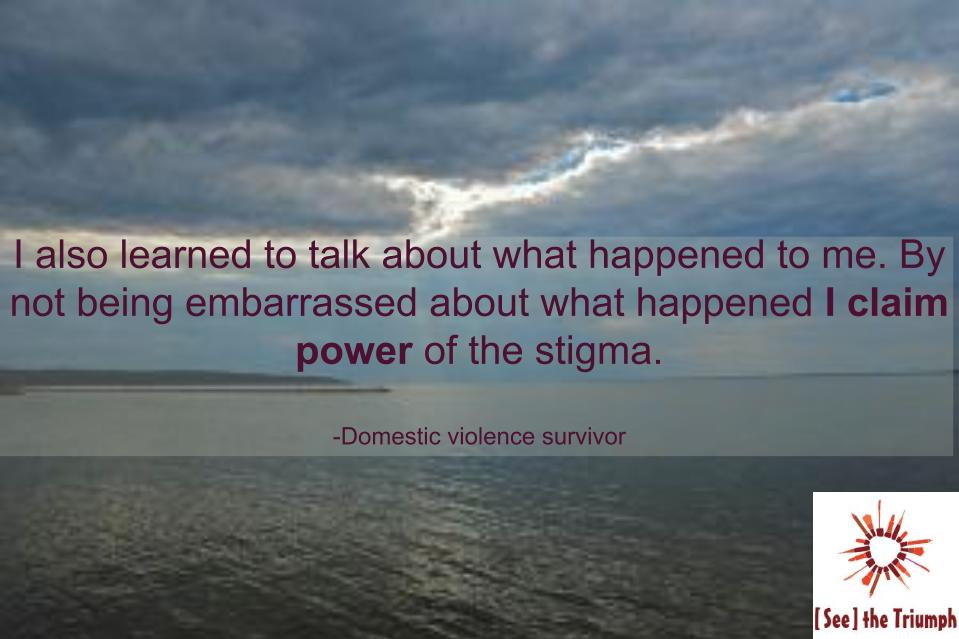
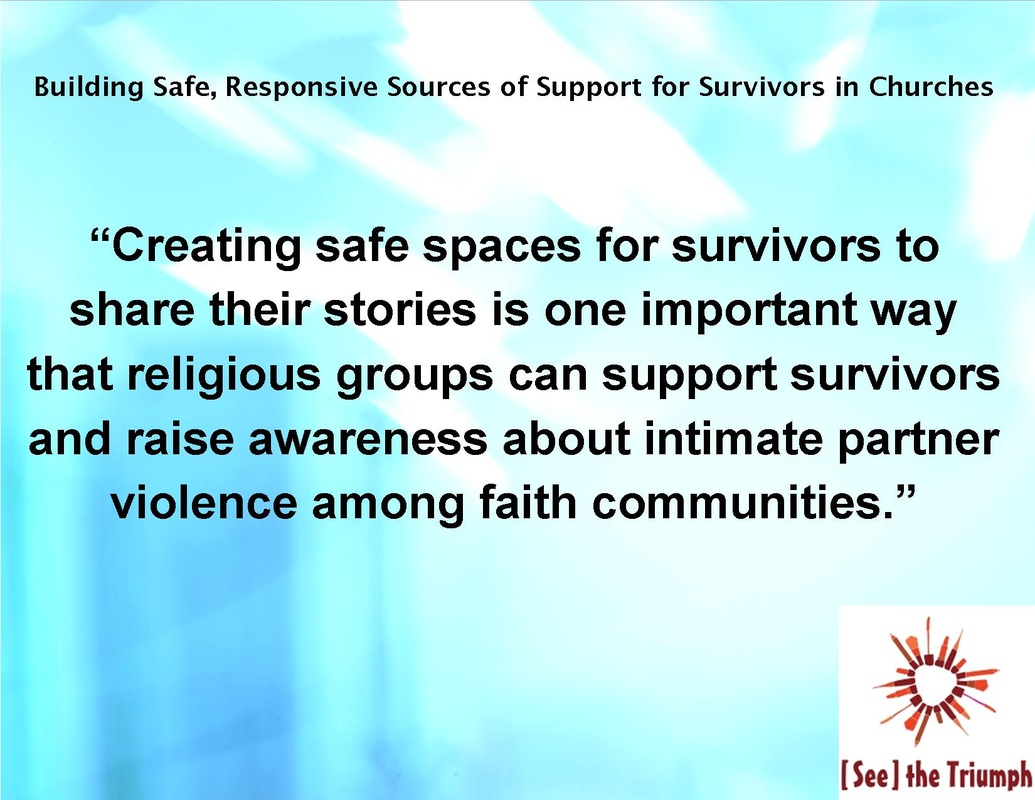
 RSS Feed
RSS Feed